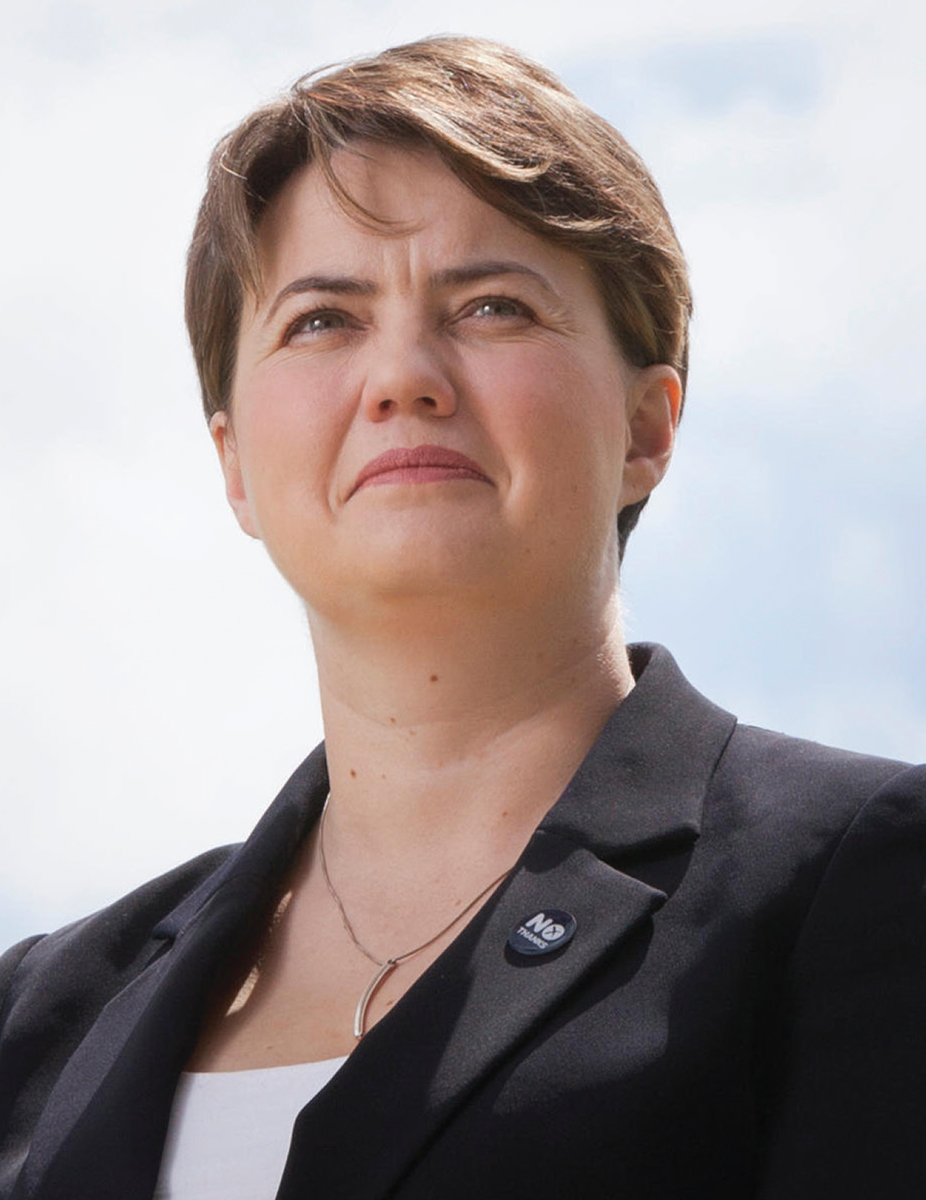
Ruth Davidson led the Scottish Conservatives from 2011 to 2019 and stepped down after Boris Johnson became Tory leader, citing political and personal reasons for the move. She is the former leader of the Scottish Conservative and Unionist Party and an ex-Territorial Army veteran and BBC journalist. Her ‘personal’ reason was the arrival of her son Finn, with her partner Jen Wilson and clashing with UK Tory leader Boris Johnson over his hard-line Brexit stance. By Maarten Hoffmann
Seen as a solid media performer, Davidson was widely judged to have had a ‘good’ independence referendum and made her strong opposition to a new poll one of the central issues of her leadership.
She has been well rewarded for her allegiance to the Tories ‘up north’ with a peerage and elevation to the House of Lords. Just as rumours abound about the slimming down of the bloated upper House, Davidson joins a band of merry new peers tipped for the House in Theresa May’s dissolution honours list as one of her parting gifts, along with May’s husband Phillip and Boris Johnson’s brother Joe Johnson.
She was named recently as one of the world’s 100 most influential people by Time magazine.
Ms Davidson worked wonders for the Scottish Tories when she was their leader, winning a record 31 MSPs at the 2016 elections, which meant they overtook Labour to become the main opposition party at Holyrood, and then taking them from one MP to 13 in the 2017 Westminster election.
She has put the cat amongst the pigeons by suggesting she could return to frontline politics and lead the Tories from Westminster when they are next in opposition.
In an interview for the Sunday Telegraph’s Stella magazine, the MSP for Edinburgh Central hinted that she could re-enter politics when her one-year-old son was older.
“It may well be that my time in politics doesn’t come again until we’re in opposition,” she said. “I’ve probably got more experience than anyone in the party on how to lead from opposition.
“If someone tapped on my door and asked me to help, I’d be there in a heartbeat. But at the moment, I’ve got four or five years when my son isn’t at school and that is not a time that I’m contemplating moving 450 miles away for the majority of the week. It’s just some things are more important than politics.”
Davidson is considered the most successful leader of the Scottish Conservative party since devolution. She campaigned to stay in the European Union in the 2016 referendum and had been open about her reservations about Boris Johnson’s leadership of the Conservative party before her resignation.
She also spoke about coming out to her family as gay and about the homophobic abuse she has received as a politician. “I was in my mid-20s when I came out – quite late,” she said. “I didn’t know for ages, which is surprising, looking back. I came out to one member of my very close family, it didn’t go well, so I didn’t come out to the rest for two years.”
Davidson said she could get up to 1,000 abusive tweets a day when she was Scottish Tory leader. “It wears you down. I’ve had a lot of ‘string her up by a lamppost’ type stuff; ‘unionists, turncoats, traitors’,” she said. “And I had an incident where someone got my phone number and made threats. It turned out not to be that sinister, but I didn’t know that when I was being told they wanted to burn all gays.”
Davidson, the first UK party leader to have a baby while in office, gave birth at Edinburgh Royal Infirmary on October 26th 2018. Davidson joins the prime minister of New Zealand, Jacinda Ardern, who gave birth earlier that year, as one of the few women to have had a child while serving as a party leader.
In her recently published book on famous women, Yes She Can: Why Women Own the Future, Davidson said she had been preparing for IVF treatment while travelling to Davos in Switzerland for the World Economic Forum.
She wrote that the experience of being pregnant had been “invasive, joyous, mortifying, fearful and hopeful”.
She also described how it felt to have nurses recognise her when she went for checkups: “There is a special feeling of wanting the earth to swallow you whole when you are led in a hospital gown to the room where an internal examination is going to take place by a nurse who decides to strike up a conversation with: ‘I saw you on the telly last night, talking about the NHS.’”
Of course, the peerage is only in part thanks for what she had done and in part for what Boris expects her to do next - and that is help in the fight to combat a Scottish independence vote. Alex Salmond has done his bit in trying to bring Nicola Sturgeon down, which failed when the enquiry found she had not broken any rules, so now here comes their next assault, Lady Ruth Davidson.
Sturgeon is obviously rattled by the Tory tactics to stop her. During First Minister’s Questions recently, Nicola Sturgeon teased Davidson about heading down to the Lords, however her attack on the Tory Holyrood went a bit far for the Presiding Officer after he told her to tone the assault down.
Sturgeon said: “So in the next parliament I hope to be standing here but that’s up to the Scottish people.
“But while Ruth Davidson is off for taking £300 a day to sit in the unelected House of Lords, those in this chamber will be getting on with the job of improving education for all.”
Those on the SNP bench erupted in laughter, however Ken Macintosh attempted to cool things down. He told Sturgeon: “I appreciate this is a political exchange and I always allow some latitude. But the First Minister has twice mentioned the House of Lords and I get it and I do understand it. However the point has been made, I’d rather it wasn’t so personal.”
Afterwards as announced, she would head down to London, Davidson said: “I am honoured to follow in the footsteps of former Holyrood parliamentarians such as Jack McConnell, Jim Wallace and Annabel Goldie in being nominated for membership of the House of Lords.”
“As a chamber dedicated to scrutinising and revising legislation, the upper house is stronger when it includes a range of voices with experience from different jobs, backgrounds, specialities and parliaments across the UK, and I believe I can make a contribution to its work.
Of course, the drama over Salmond stating that Sturgeon knew about the sexual assault claims against him came far earlier than she admitted. Whether she did or not is now old news as she was cleared of breaking the ministerial code and when it comes to breaking the ministerial code, the Conservatives also have form.
Priti Patel, the Home Secretary, was found to have broken the rules last year – but Boris Johnson decided she could stay on anyway. Tory MSPs had every right to question Sturgeon on what she knew and when. However they must understand their calls for the First Minister to quit are severely undermined by Patel’s behaviour
There are questions still to be answered by Nicola Sturgeon despite her near eight-hour session answering questions from MSPs on the Alex Salmond Inquiry and the whole sorry mess cost the taxpayer at least £600,000 and damaged the reputation of our democratic institutions in the process.
So can Ms Davidson really be the Tories‘ secret weapon in dis-arming Nicola Sturgeon?
The Scottish Tories could deny the Scottish National party a majority at Holyrood, Davidson has insisted. She said that the SNP winning an overall majority in May’s Scottish parliament election was no longer the “nailed-on near-certainty” that polls had once predicted.
But to stop Sturgeon’s party winning that majority – and then using it to push for a second Scottish independence referendum – the Tory Holyrood leader urged all Scots opposed to breaking up the UK to back her party in the regional section of the vote, even if they had never voted Conservative before.
Speaking as she addressed the party’s Scottish spring conference, Davidson insisted it was only the Tories who could stop the SNP from winning more than half the seats in the Scottish
parliament.
“Casting your ‘party’ vote for the Scottish Conservatives, even if you never have before, and even if it’s just this once, is the only way to stop that SNP majority. No other vote can be sure of preventing an SNP majority and the independence referendum they want to hold.”
She told the conference: “Labour are in third place across Scotland and they’ve said they won’t work with other parties to block the SNP. The Lib Dems are in fourth place and can’t effectively challenge the Nationalists. The Greens have backed the SNP throughout this parliament, and will do it all over again if they’re given the chance.”
While Davidson accepted that “barring a complete implosion” the SNP would emerge from May’s election as the largest party, she was clear that a “majority Nationalist government can be prevented”.
She stressed this was “vital” because it was “the only way to be certain that Scotland isn’t dragged back into another independence referendum when we all need to be focusing on building a recovery from the pandemic”.
May’s campaign and vote, taking place amid the ongoing coronavirus pandemic, will be an “election like no other”, Davidson said, as she warned the outcome of the vote “could have profound consequences for our country as a whole and for families the length and breadth of Scotland”.
She warned if Sturgeon’s party did succeed in winning a majority “they will put their obsession with securing a second independence referendum above Scotland’s national interest”.
Davidson insisted: “At this uncertain time, the only priority that our governments should have is to work together to manage the Covid crisis and rebuild our country. But the SNP have made it clear, if they win a majority in May, they will try to hold another independence referendum in short order.
“They’ve said it could come as soon as the second half of this year. And some of them are even pushing for an illegal ‘wildcat’ referendum. In the midst of a global pandemic, when the only priority should be pulling together to defeat it, to get the country back on its feet, the SNP’s priority is to divide us all over again.
“Over the last few weeks, something in Scotland has changed. The Nationalist bandwagon, rolling unstoppably towards their dream of a second independence referendum, is now backfiring.”
Ms Davidson said the SNP’s popularity was on the wane and claimed there were a “lot of different reasons for this”, pointing to “the SNP’s poor record of delivery across our public services” and “their increasingly highhanded attitude as a government that thinks it can do what it likes and get away with it”.
But with Sturgeon having being forced to deny claims from her predecessor, Alex Salmond that there was a conspiracy against him, and MP Patrick Grady having stood down as chief whip after harassment allegations were made against him, she said there was an “increasing stench of sleaze and scandal” from the SNP. She said: “We’ve passed ‘peak Nat’ and, more and more, Scotland is saying ‘enough’.”
SNP deputy leader Keith Brown said the momentum was “firmly behind” his party. “The Tories can dress up their desperation anyway they like, but they won’t fool Scottish voters who can see for themselves Boris Johnson’s attempts to rip up Scotland’s democracy,” he said. “Both votes for SNP at this election is the only way to deliver the change that is required if we are to build the greener, fairer and healthier Scotland that we all know is possible.”
Whatever the outcome, the Scottish First Minister’s blind push for independence is seen as a personal vendetta against the English and would result in leaving her historic mark on world politics. This is despite the fact that it would leave Scotland a poorer ‘third world country’ with no currency and barely enough income to cover its bills.
Brexit has amplified the independence cause, as they voted 62% for remain. Now, though, Scotland would be faced with the same kinds of choice that faced the UK, and indeed the EU, after the Brexit vote. Would an independent Scotland have a hard or soft border with England? Would it wish to be a full member of the EU single market and customs union, or the UK equivalents? What about a common travel area, as Ireland and the UK still enjoy, uniquely?
If Scotland seeks to be a full member of the EU, enjoying all the benefits and global clout that brings, how will it run its economic border with the UK? Or, more accurately, given that the border of an independent Scotland with England would also be the second land border between the EU and what remains of the UK, what does the EU want it to be? Will it be a world where English tourists have their ham sandwiches confiscated at the border on the A74? Will the trains stop for a passport check as they cross the border? And who decides that – Brussels or Edinburgh? If you’re born in England, but your mum is Scottish, can you get an EU passport too?
The harsh reality of hard Brexit has revolutionised the terms of the debate on Scottish independence since 2014, when all concerned could assume continued EU membership across the British Isles. Politically, Brexit and its aftermath has made independence more attractive than ever for many Scots (though still with a substantial Unionist minority); but economically it is presenting near-insurmountable obstacles to trade and working across the border. Of course, we could all pretend that it is perfectly possible with goodwill all round for Scotland simultaneously to be part of the UK customs union and single market, and also part of the EU customs union and single market.
It is, though, the kind of magical thinking that everyone indulged in during the early stages of Brexit, and Northern Ireland provides the living proof that you cannot have your cake and eat it. Anyway, it will be up to Brussels as much as Scotland to decide what the new border looks like.
Independence might be inevitable, but it has to be contemplated with some sense of reality, with the reality of Brexit in front of our eyes. Scotland’s freedom from unending Tory rule from London may well be unavoidable, because the constitutional position is simply unsustainable, and is intolerable to most of the Scottish people. Can they face another 5,10,15 years of English Tory rule, even with devolution? Probably not.
In the very long run, Scotland will make its own choices. In the short to medium term, though, the Scots will be poorer, but happy. Just like the English.





